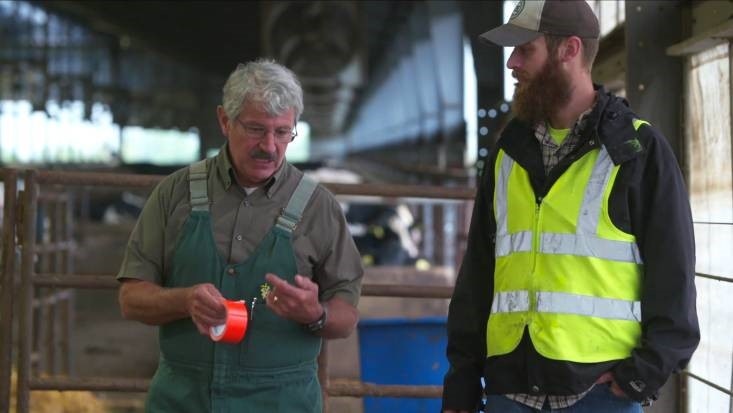Module focuses on strategies to prevent diseases from spreading within a dairy operation.
May 14, 2020

Merck Animal Health has released its next Dairy Care365 training module on biocontainment, which is the second module of a two-part "bio-awareism" series featuring biosecurity expert Dr. Danelle Bickett-Weddle, associate director of the Center for Food Security & Public Health in the Iowa State University College of Veterinary Medicine.
The module focuses on strategies to prevent diseases from spreading within a dairy operation, known as biocontainment, Merck Animal Health said. More specifically, the module contains best practices to follow to assure that animals have fewer disease challenges that affect their health, productivity and profitability.
Topics include: biocontainment basics, maternity and calf areas, hospital pen management, quarantine for newly introduced animals, feed and water quality and selecting and using disinfectants, the announcement said. By implementing practices described in the module, the spread of disease is minimized, and the risk of cattle and humans being exposed to potentially harmful substances like salmonella and Escherichia coli is reduced.
“The coronavirus pandemic has brought on-farm biosecurity more to the forefront,” said Dr. Todd Bilby, associate director of ruminant technical services at Merck Animal Health. “Prevention of disease spread is essential to the sustainability of any dairy farm. This bio-awareism series is a holistic approach to minimize effects of infectious agents by focusing on disease threats from both outside and within the farm and also relying on concepts of separation, vaccination and cleanliness. Our goal with this biocontainment module is to provide farms with tools that aid in training employees on best practices to minimize disease spread within the dairy.”
Easy-to-execute practices
“This training module will help producers and veterinarians identify where they should be using best practices to assure a healthy herd as well as where more attention to detail is needed,” Bickett-Weddle said. “Prevention of disease is the most efficient method of keeping dairies productive, which is the overarching theme of the easy-to-implement biocontainment practices described in the training module.”
One of the most important aspects from the module focuses on the significance of separation. This tactic is effective in preventing the spread of disease when boundaries are respected, which starts at the perimeter of the farm. Planning the order of daily chores on farms — handling the youngest animals first and newly introduced animals last — is discussed. It covers the importance of establishing protocols when sick or lame animals can return to their regular pens as well as how feed is handled to minimize its exposure to disease-causing pathogens. Providing cows with high-quality, fresh, clean feed and water is also emphasized.
Merck Animal Health said the module describes the important role of vaccinations and treatments as part of a biocontainment plan to enhance cattle health. Proper cleaning and disinfection procedures to prevent the spread of disease — or to use after a disease outbreak — are also taught.
The training is offered as a 15-minute module in English or a 20-minute module in Spanish. The video training module is followed with interactive questions to reinforce the key learnings. With at least 80% correct answers, a personalized certificate of completion can be printed and awarded to the participant. A standard operating procedures template is also included with the module for managers to use alongside their veterinarian to build protocols.
Dairy Care365 Training Series
During this time when group activities are on hold, remember that dairy employee training can continue through Dairy Care365. From a computer or mobile device, the animal care training is easy to access 24 hours a day. If accessing from a phone or tablet, users will be prompted to download the Go.Learn app and then to type in Training.DairyCare365.com to register or log in to the website.
Available in English and Spanish, there are eight module topics about animal handling, calf care, emergency care and bio-awareism. Visit DairyCare365.com to learn more about the program.
You May Also Like



